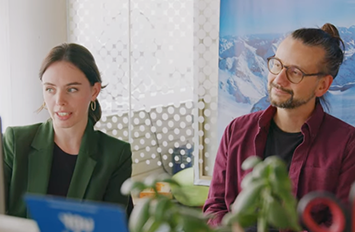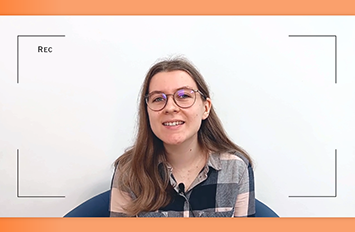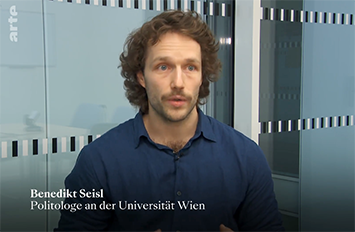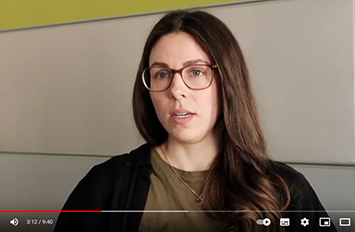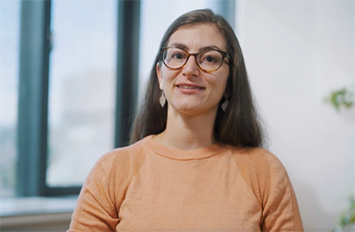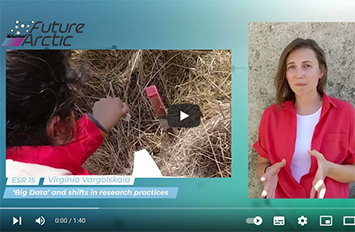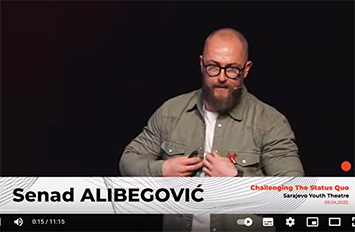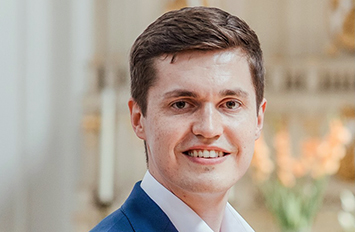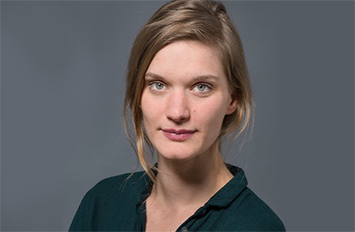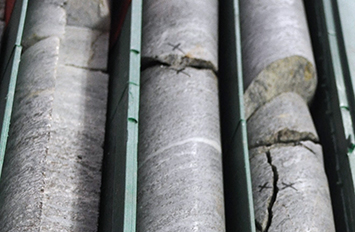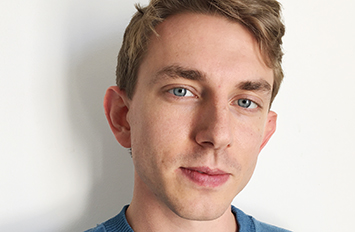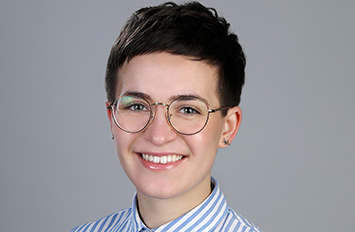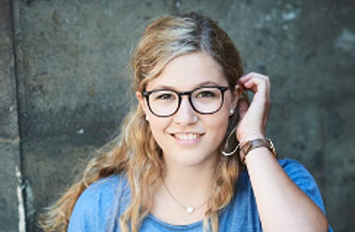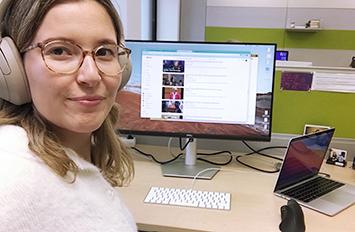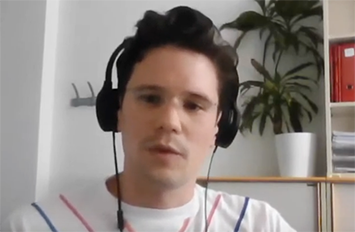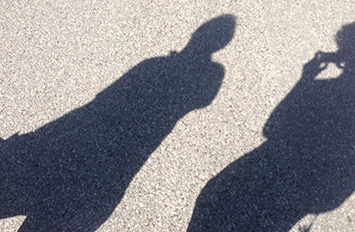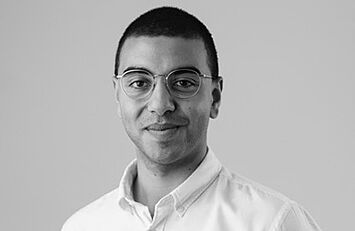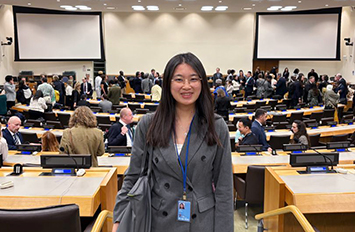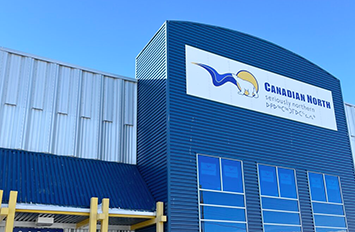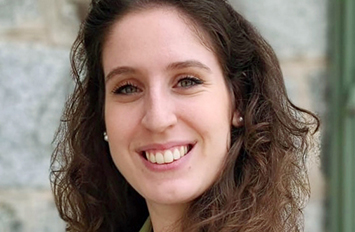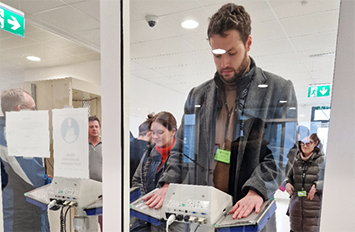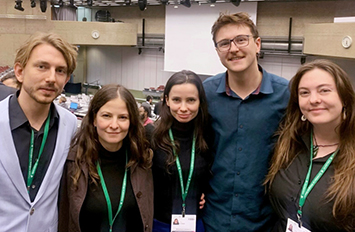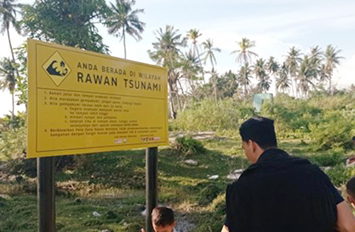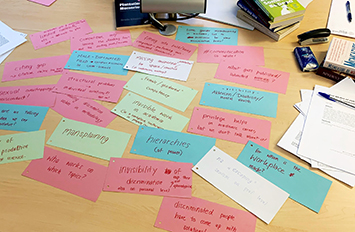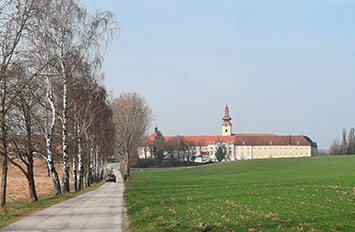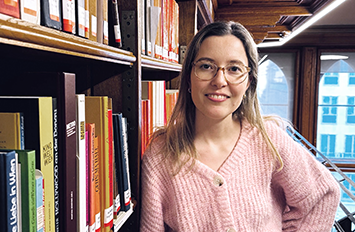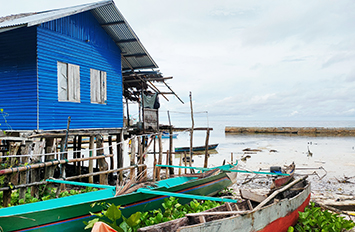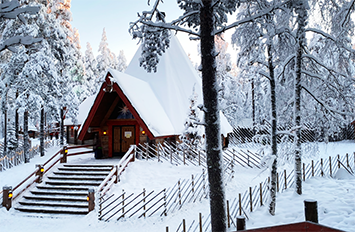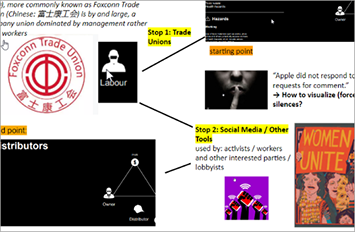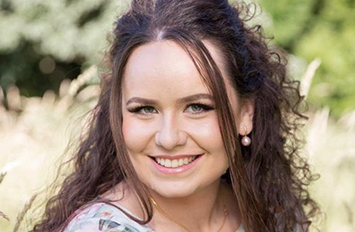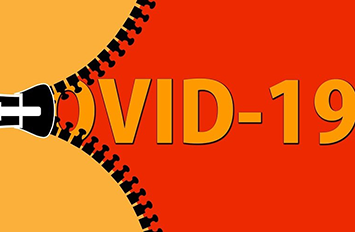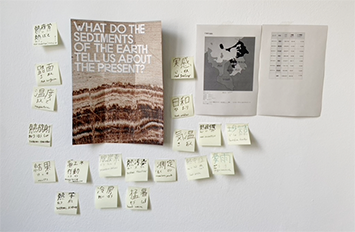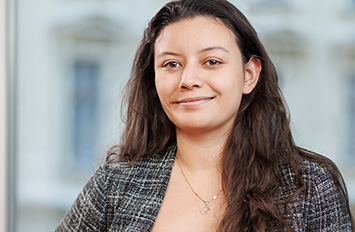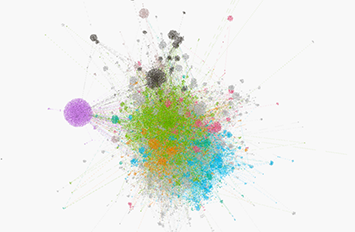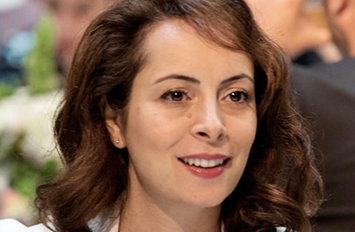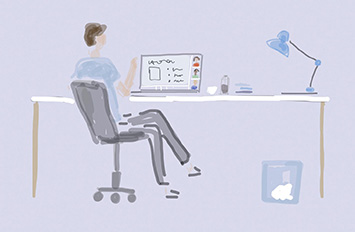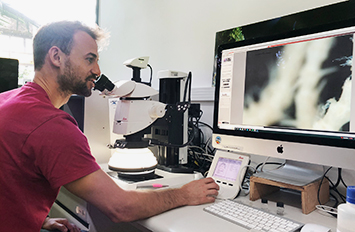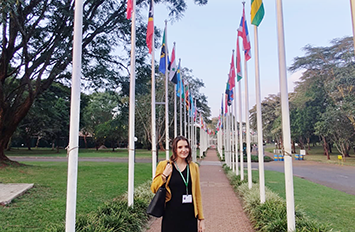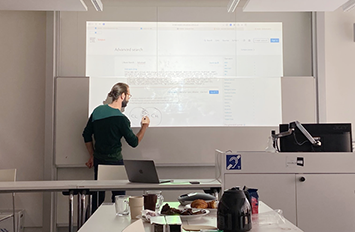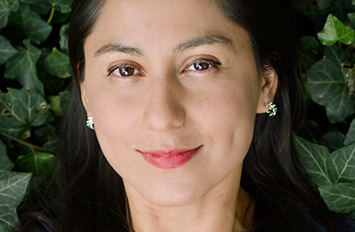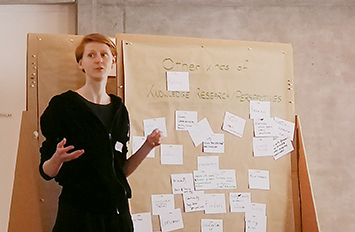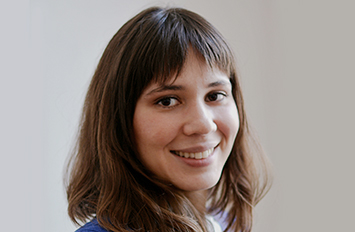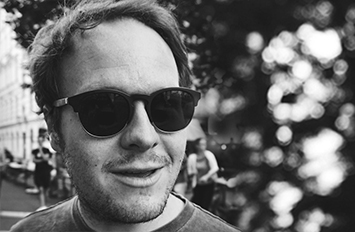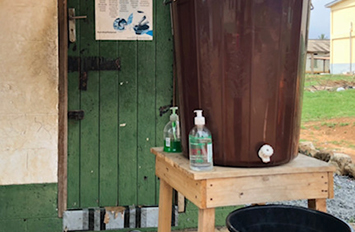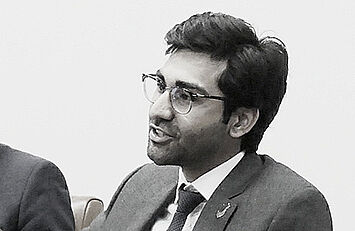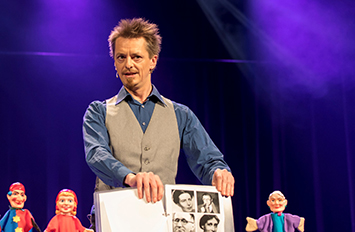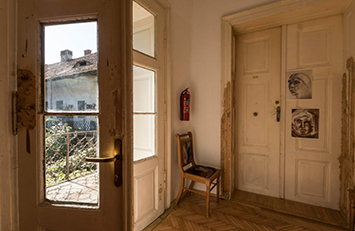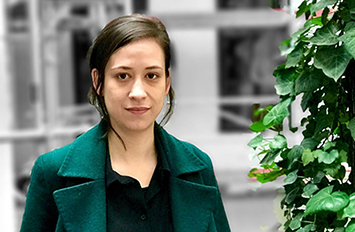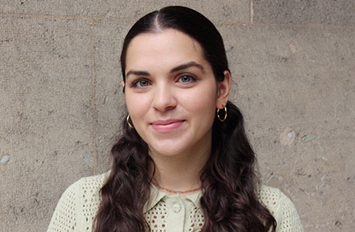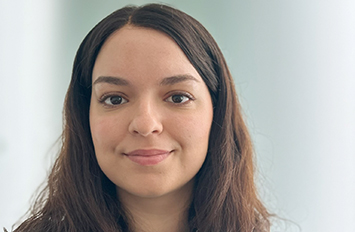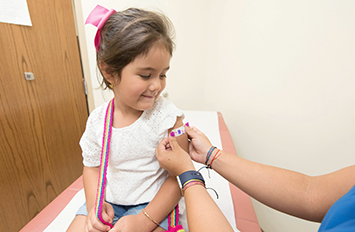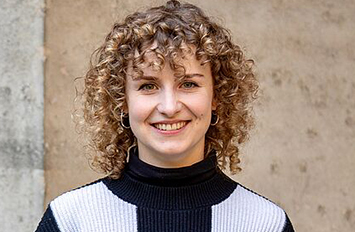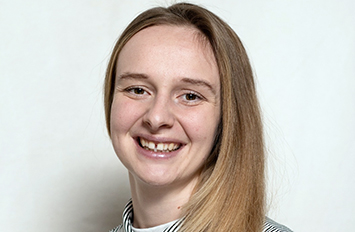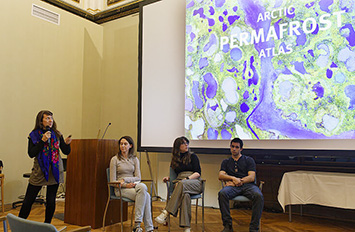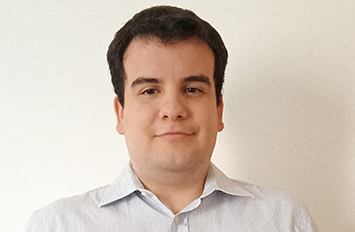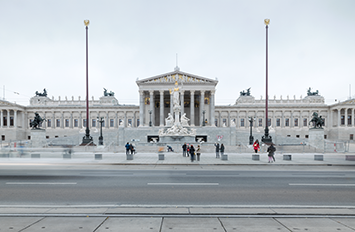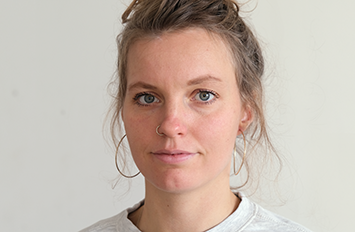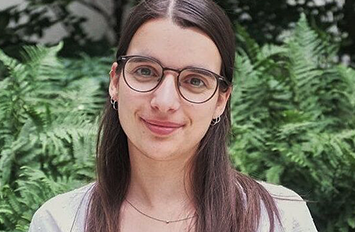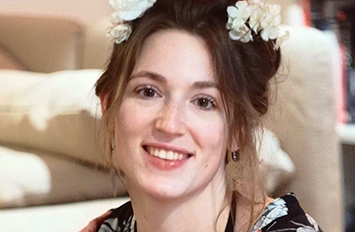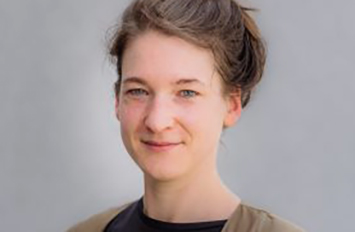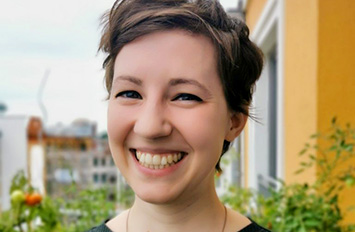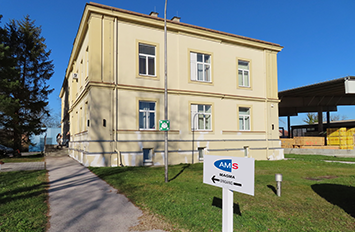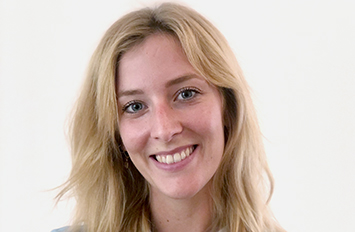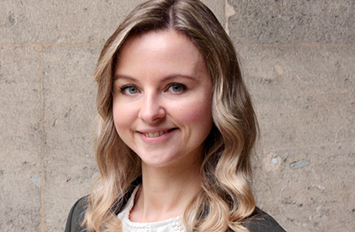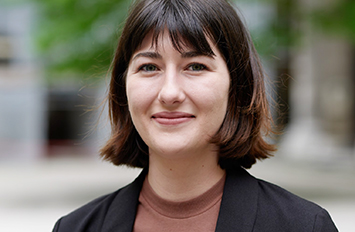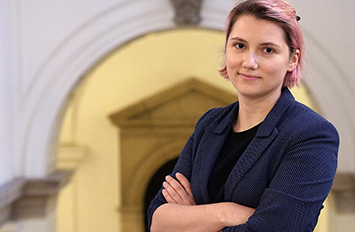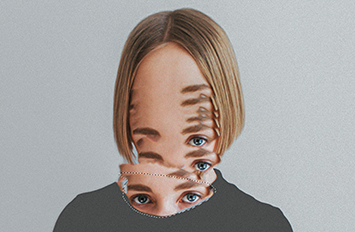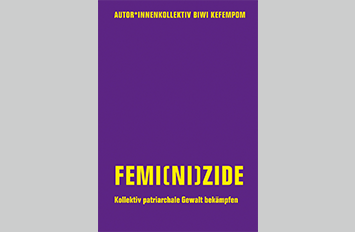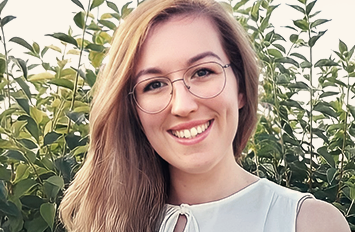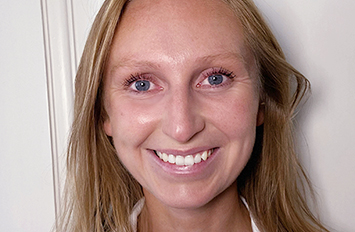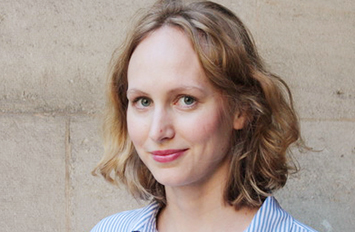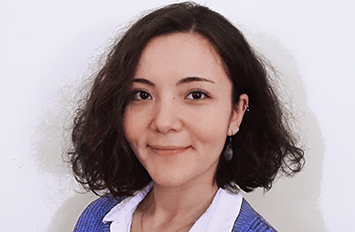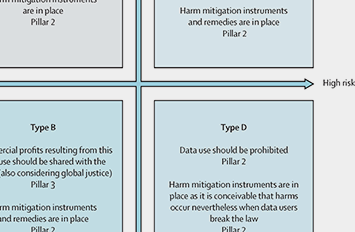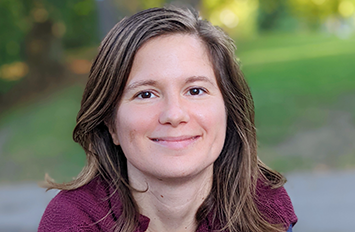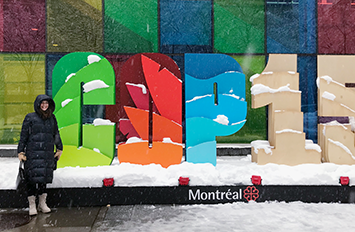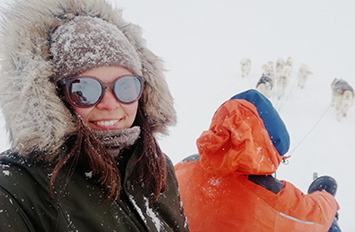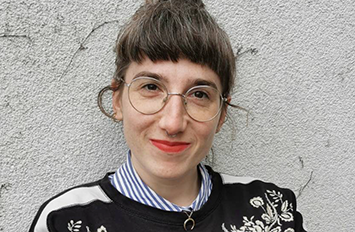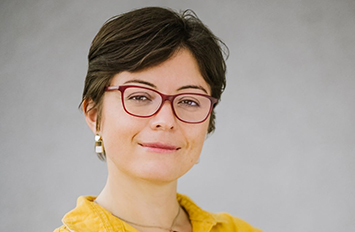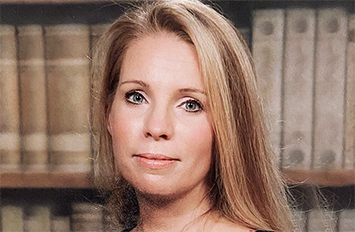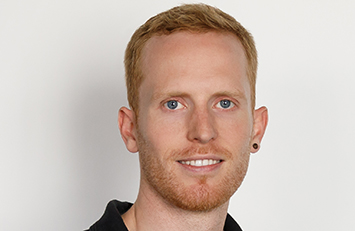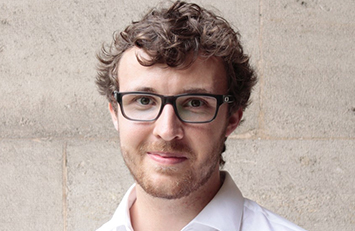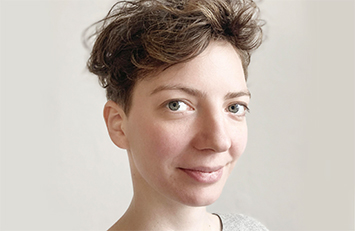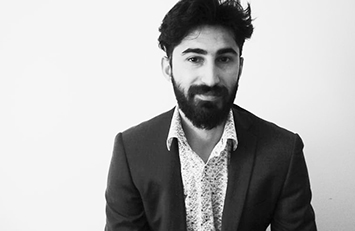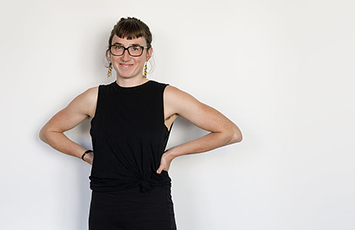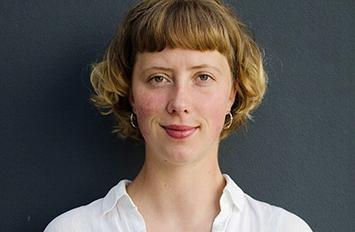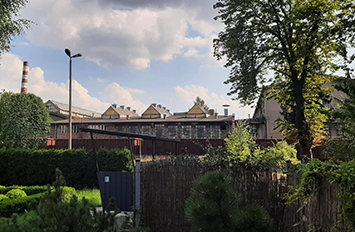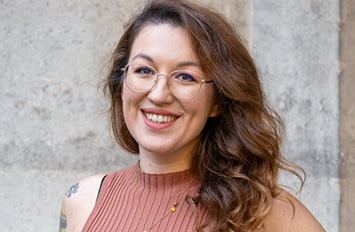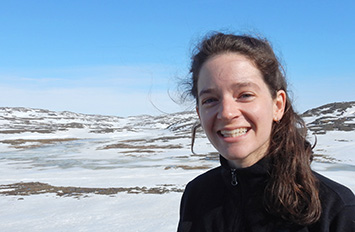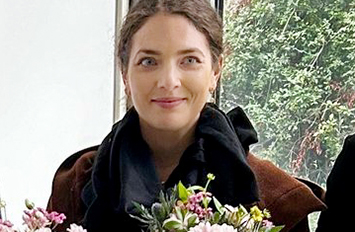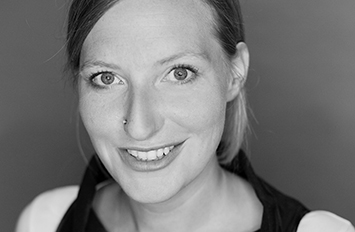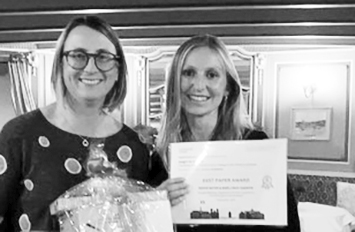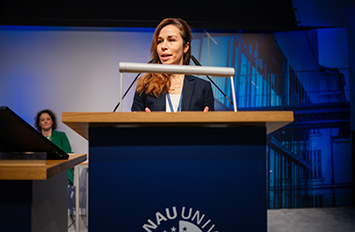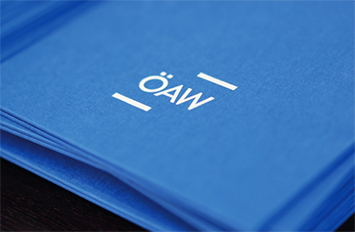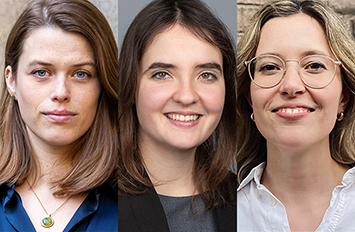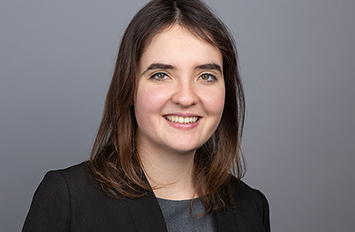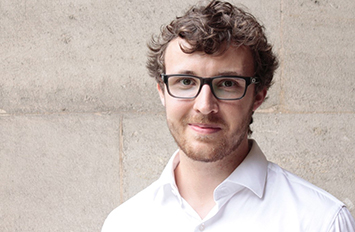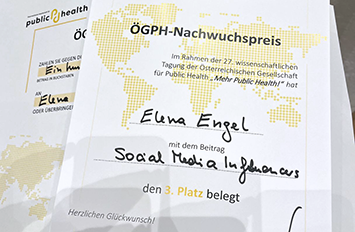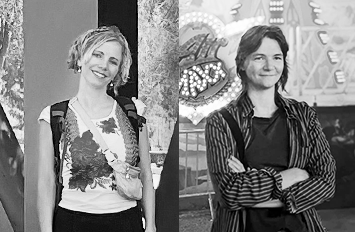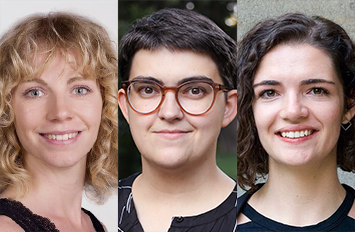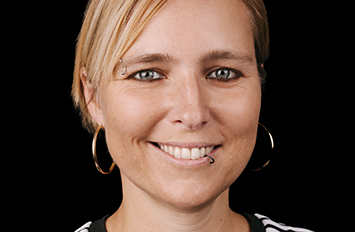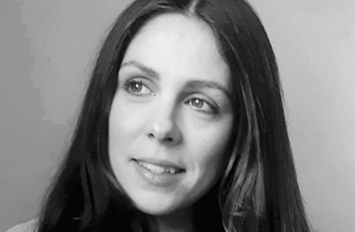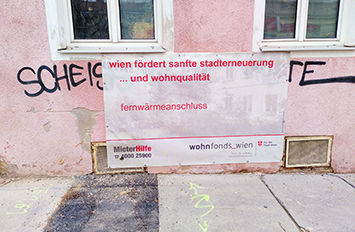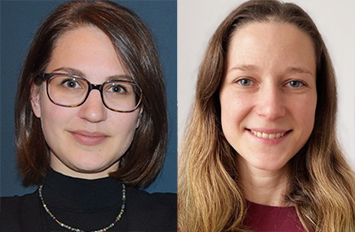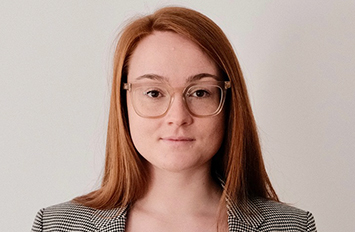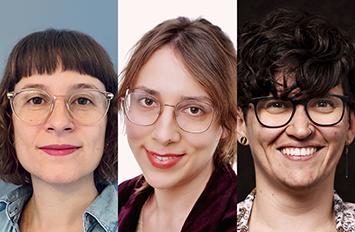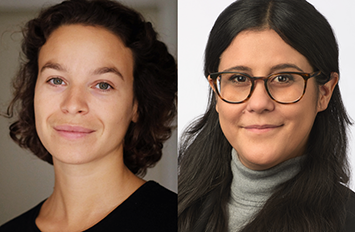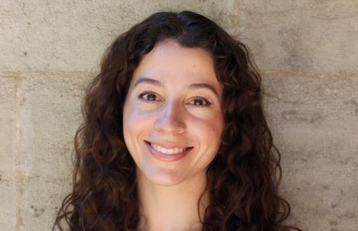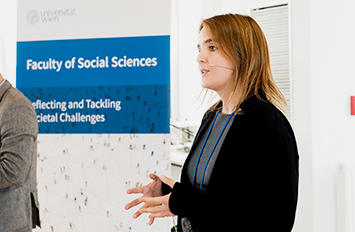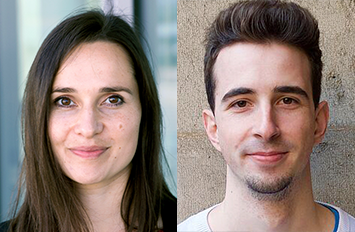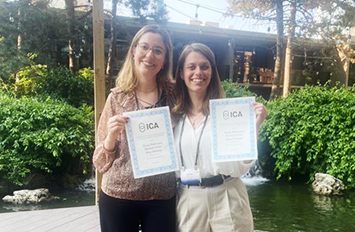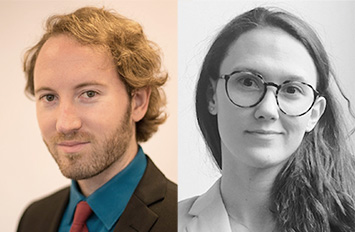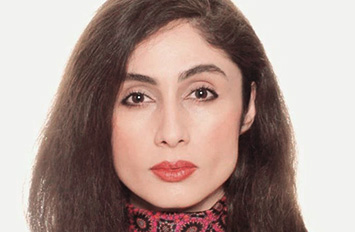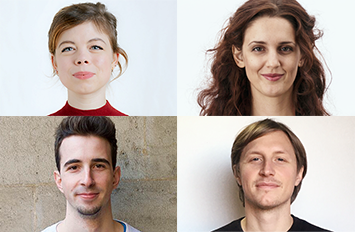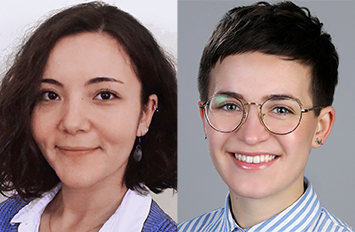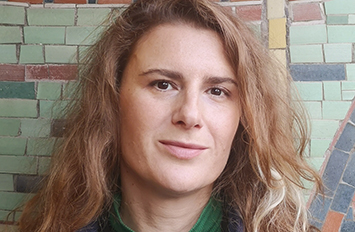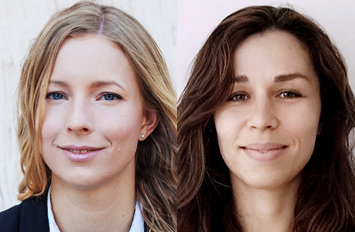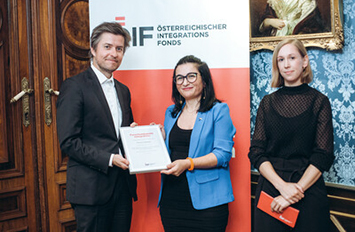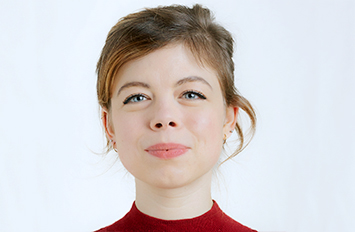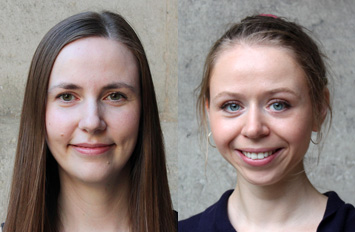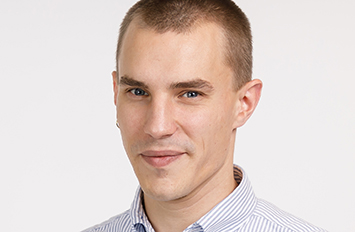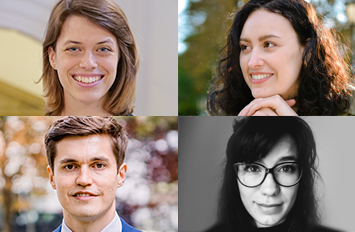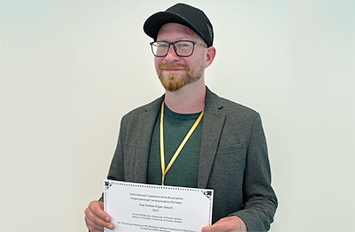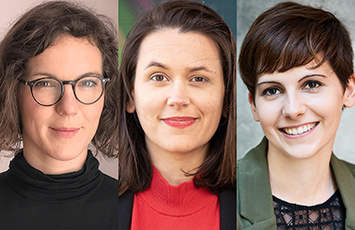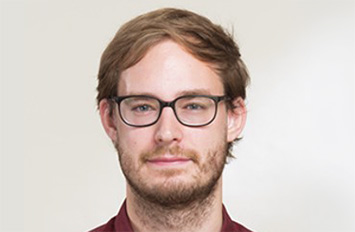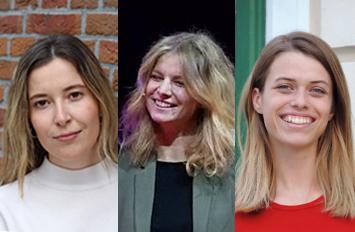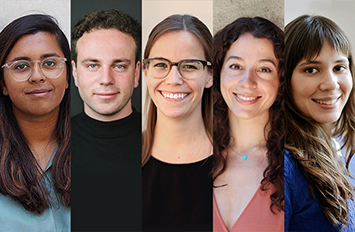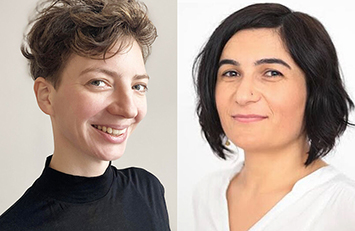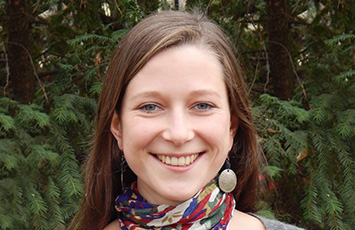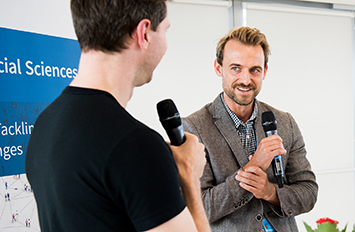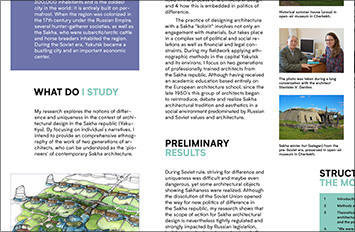PhD in the spotlight
Video
Health risk: influencers
The perfect protein shake, the five signs of ADHD, the optimal workout routine? Communication scientists and ViDSS Students Elena Engel and Sascha Gell were interviewed for the science communication initiative FÄKT. Together with Kathrin Karsay and Raffael Heiss, they explain how we can distinguish between genuine health tips and hidden advertising. (In German)
Elif Gül: How to better birth care
Childbirth is often associated with joy, family, and new beginnings, but what happens when it becomes a source of harm? According to recent EU reports, 21–81 % of birthers across member states have experienced some form of obstetric violence, from denial of hospital admission to physical or verbal abuse. Elif Gül, ViDSS student in science and technology studies, delves into obstetric violence and reproductive justice, specifically birth justice, a concept introduced by Black feminist activists in the 1990s.
What does participation mean?
Political scientist Jule Kegel explains in a short video class for children what participation means and why it is important for democracy. The initiative is part of the project “Nachgefragt” organised by the Kinderbüro of the University of Vienna. (In German)
Did Austria learn from storm Boris?
Political scientist Benedikt Seisl explains in an interview for the TV channel Arte why the Austrian Green Party and the conservative Austrian People’s Party were not able to agree on a strong climate protection law during the time of their coalition. (In German)
Jula Lühring: Misinformation and emotions on social media
In social media, misinformation is often difficult to distinguish from facts. While the World Economic Forum has highlighted mis- and disinformation as one of the short-term global risks, research indicates that only a minority of people actually believe in it, typically when it aligns with their existing beliefs. Communication scientist Jula Lühring investigates whether emotions make us fall for misinformation or help us to recognise it and explains what role AI plays in this.
Ina Tessnow-von Wysocki: How science shapes UN negotiations
Political scientist Ina Tessnow-von Wysocki explains how she studies intergovernmental negotiations on the level of the United Nations and why she wants to improve science-policy interfaces for a more equal, just and inclusive knowledge base for future international agreements. With her research, Ina won the Impact.Award which honours outstanding dissertation projects with the potential to achieve social, cultural or economic added value.
Clara Holzinger: Linguistic diversity and social justice
Sociologist Clara Holzinger explains why and how she explores the tension between traditionally monolingual organisational structures such as the Austrian Public Employment Service and de facto social plurilingualism. She won the Impact.Award 2022 that is awarded for outstanding dissertation projects with the potential to achieve social, cultural or economic added value. (German with English subtitles)
Ana Cartaxo: Missed nursing care in Austria
The Corona crisis has shown: Nurses keep our health system running; and although Austria has the highest hospital bed density, the number of nursing staff is low. Ana Cartaxo from the Department of Nursing Science is investigating this discrepancy in her PhD project.
“Unser Leben mit Plastik”: Encouraging youth to discuss plastics
Laura Bomm from the Department of Science and Technology Studies presents the discussion game that she recently created for the ScienceCenter-Netzwerk. The game is inspired by a citizen engagement method that she developed together with colleagues earlier in her PhD and will accompany the Ocean Eye Escape Box on its journey through Austria. (In German)
Dating apps and their effects on romantic relationships
In the documentary “The Tinder Trap” produced by the Austrian TV channel Puls 4, communication scientist Marina F. Thomas explains why we start to use dating apps, why it’s difficult to stop swiping and how online dating influences the way we perceive and assess others when searching for a partner. (In German)
FutureArctic: ‘Big data’ and shifts in research practices
Virginia Vargolskaia from the Department of Science and Technology Studies tells us what a social scientist can do for climate research and machine learning. FutureArctic is an EU MSCA funded ITN, taking a glimpse into the future of the (sub)Arctic in a warming climate.
Digital remedy for countering hate speech
Living in this day and age it is almost unavoidable to encounter hate-speech and bullying. ViDSS student Senad Alibegović explains at TEDxFerhadija why small groups are possibly the best remedy for it.
Faime Alpagu: Migration narratives
While it is well accepted that migration shapes society, the perception of this complex phenomenon is often shaped by clichéd images of migrants. Focusing on biographies, moving objects and different modes of expression, sociologist Faime Alpagu contributes to a comprehensive understanding of migration.
Jana Egelhofer: The fake news debate and its consequences
Reports on the coronavirus as a Chinese bioweapon or the ‘Pizzagate’ theory demonstrate that fake news is one of the most widely discussed topics in political communication. Jana Laura Egelhofer takes a closer look at the current debate surrounding the term ‘fake news’.
Wanda Spahl: Health needs of refugees
Political scientist Wanda Spahl conducts research on the health needs of refugees and investigates whether and how these needs are met. With her research, she aims to find ways to provide solutions for those who have struggles to use their rights for health care. (German with English subtitles)
Sigrid Wenzel: Fieldwork in the Sakha republic (Yakutia)
Social and cultural anthropologist Sigrid Wenzel talks about her doctoral project on human-infrastructure relations in the context of a newly constructed railroad line. (German with English subtitles)
Radio and podcast
The youth of today?
An underestimated generation: What does “Generation Z” think about politics, work and social cohesion? How does society consider their perspectives and how can communication between generations be improved? In Ö1 “Punkt eins”, sociologist Paul Malschinger presents his research about young people, their goals, perspectives and participation in society. (In German)
Divorce from the perspective of children
What is a family? Why do parents separate? How much say should children have in a divorce? In the Podcast “Focus” of ORF Radio Vorarlberg, sociologist Viktoria Parisot presents a project in which divorce was researched from the perspective of children. By using a participatory approach, the researchers invited primary school children in Vienna and in a small village in Tyrol to discuss the topic – regardless of whether they themselves had experienced a parental divorce. (sound.orf.at, in German)
The race for critical raw materials
In the Ö1 Podcast “Dimensionen”, political scientist Gabriel Eyselein provides insight into the European raw-material policy and raw materials’ criticality. A range of raw materials are considered critical by the EU because they are of great economic importance and there is a high risk of supply disruptions. In the face of geopolitical tensions and global competition, the EU is reassessing its strategies for securing these raw materials. (In German)
International treaty on the use of genetic resources
Political scientist Paul Dunshirn was interviewed for Ö1 “Journal um acht” about the international efforts to regulate the use of genetic resources. He explains why the new treaty of the World Intellectual Property Organization (WIPO) affects especially those companies who have benefited from the lack of regulation so far and why this indeed comes down to the question of who owns nature. (In German)
Cobalt Rush: How can the DRC benefit from the extraction?
Aleksandra Wojewska from the Department of Development Studies was interviewed for the Ö1 podcast “Matrix” about her doctoral research on price formation and socio-ecological transformation in global production networks. Aleksandra provides insights into local dynamics of extraction in the Democratic Republic of Congo, explains the history and politics of exploitation and traces the journey of Cobalt from Africa to Asia.
#aBitOfCCS on algorithmic topic modeling
In the new episode of “What is it about computational communication science?”, Jana Bernhard talks with Mario Haim about her approach to topic modelling through algorithmic embeddings to analyse political communication in Austria from 2012 to 2021. They discuss the potential need for more sophisticated methods, explain the approach Jana has taken and discuss whether it was actually worth it.
The ambivalence of leaving and arriving
On the podcast “Aufnahmebereit”, ViDSS alumna Faime Alpagu talks about her dissertation “Migration Narratives Juxtaposed”. In conversation with Judith Kohlenberger, Faime explains what she found when she analysed biographies, photos and (audio) letters of so-called guest workers in Austria and compared them to official documents such as working contracts. (In German)
FFSci Feierabendtalk with Teresa Weikmann
In the new episode of “Fast Forward Science Feierabendtalk”, “What the Fact?! Fake News auf Social Media”, communication scientist Teresa Weikmann explains why cheap or shallow fakes are still more common than political deep fakes and what we need to prepare for when it comes to the future of visual disinformation. (In German)
Health, pandemic and refuge
In Episode 288 of the Podcast “Ars Boni”, ViDSS students Ivan Josipovic and Wanda Spahl discuss with Nikolaus Forgo the insights that their doctoral research projects provide into the health situation of refugees and the changes that the pandemic and the war in Ukraine have brought. (In German)
Radio Klassik: What does solidarity mean?
Political scientist Wanda Spahl discusses the meaning of solidarity, talks about the concept’s history and presents findings from her PhD project about refugees’ health needs and from the international qualitative research project Solidarity in Times of a Pandemic. (In German)
Digitize! in the podcast Ars aequi
Together with Filip Paspalj, political scientist Seliem El-Sayed presents the project Digitize! where he is developing ethical and social standards for the collection and use of data in Computational Social Sciences.
Blog
Setting up institutions during the first BBNJ PrepCom
(by Wenwen Lyu)
From 14–25 April 2025, states gathered at UN Headquarter in New York for the first meeting of the Preparatory Commission (Prep Com) under the international agreement on the conservation and sustainable use of marine biodiversity in areas beyond national jurisdiction (BBNJ Agreement). Nearly two years since the Agreement’s historic adoption in June 2023, 21 states have ratified the agreement, which would be the first of its kind on a global scale ...
Amazon in the Arctic
(by Katrin Schmid)
“Do you mind if we swing by the hub on our way home?” We drive along the paved road through the industrial area of town, toward Iqaluit International Airport, then turn right, away from the passenger parking lot and towards a warehouse with yellow pillars out front. A large sign reads, “Canadian North, seriously northern,” yet this sign is misleading – a mark of begone times ...
Patterns of immigrants’ political participation in rural Italy
(by Giorgia Zogu)
Political participation is the lifeblood of democratic governance, weaving the collective voice of the people into the intricate fabric of decision-making. In the conventional understanding, political participation encompasses a spectrum of activities ranging from voting and public discussions to contemporary forms such as internet activism and social media engagement. However, ...
Of innovation, waste and value: A visit to the Austrian interim storage for nuclear waste at Seibersdorf
(by Carsten Horn)
10 ... 9 ... Before leaving the premises, you have to undergo a radiological control measurement. If your hands and feet are correctly placed on the probes, the countdown will begin. Nuclear energy: Once the harbinger of a new era of unlimited energy supply and prosperity has come under attack by environmental and anti-nuclear movements of the 1970s. While at one point radioactive materials ...
iDSI’s reflections on the CBD’s open-ended working group on DSI: Discussions on benefit-sharing and data governance
(by Paul Dunshirn, Ayşegül Sırakaya, Adam McCarthy and Irma Klünker)
Decision 15/9 of the Conference of the Parties to the CBD, agreed in December 2022, constituted an important signpost in bringing genetic resource governance to the digital age. Until then, it was disputed whether access to and benefit-sharing from the utilization of DSI, a placeholder term for various types of genetic sequence data, should be ...
Education: Investment, inequalities and policies
(by Ekaterina Zhelenkova)
Education is today a sector in receipt of record-high and still rising amounts of investment. And for good reason, since education has proven to be the major driver behind reducing poverty, propelling development and overall welfare. Increased education is also behind lower fertility rates and better child health outcomes, especially in developing countries, where moving up just a notch on the educational ladder can ...
When to leave home? Two narratives around habitability
(by Daniela Paredes Grijalva)
Concerns around climate change impacts are increasingly coming to the surface with heat waves and flood events on the rise. The place we call home, Earth, is being transformed, in some cases in irreversible ways. Ecological and social systems are put to test; some readjusting, others collapsing. In the midst of it all, we – individuals and societies – are undertaking efforts to mitigate the adverse impacts of climate change ...
Dismantling the ivory tower: Our perspectives from within
(by Ahrabhi Kathirgamalingam and Aytalina Kulichkina)
In academic spaces, individuals from underrepresented social groups often face systemic barriers that hinder their full participation and success. Such barriers include systemic biases in hiring, promotion, access to resources, and lack of representation. Underlying factors, including persisting racism, sexism ...
Writing among monks. Field report from the Winter Writing School 2024.
(by Michael Anranter)
We were going to be quite a crowd. At least that is what I understood when the OEBB ticket inspector asked a colleague and me why there were so many travelling to Seitenstetten on a Monday morning. Is that so? – I asked. He replied that there were at least twenty of us, all travelling to what seemed to be an unusual destination. My colleague added ...
Beyond the known – my PhD journey with deepfakes
(by Teresa Weikmann)
As my PhD journey comes to an end, I am often reminded of a graphic a professor once sketched to illustrate the journey of adding to human knowledge. Picture all human knowledge as a vast circle, and at the beginning of your academic journey, you’re merely a speck in the centre. As you progress through your bachelor’s and master’s degrees, that speck grows ...
Navigating at the intersection of climate change and migration
(by Daniela Paredes Grijalva and Rachael Diniega)
After Umar, aged 46, left Morowali in Indonesia for the big city looking for work, he found his passion in diving, leading to a complementary career in tourism. Lately though, the corals are dying and the fish are fewer, despite the public-private-funded coral restoration program. Tourists have dwindled. The ocean is taking the land back. Saltwater is creeping in underneath ...
For whom do the sleigh bells toll? Unwrapping Santa’s arctic infrastructures
(by Ria-Maria Adams, Alexandra Meyer and Mia Bennett)
According to popular belief, Santa Claus operates with a flying sleigh, pulled by reindeer – including one with a red nose. This means of transport allows him to access every corner of the world, no matter how remote and disconnected, needing only a rooftop or a small clearing in order to arrive and swiftly deliver his gifts ...
In/visibilities of inequalities in the global digital transformation
(by Katja Mayer and Carsten Horn)
In our blogpost we delve into the complexities of the in/visibilities of inequalities in the global digital transformation. In particular, we explore the theme inspired by Noopur Raval’s thought-provoking commentary on the notion of “ghost work.” Raval’s commentary challenges the discourse surrounding the invisibility of workers from the Global South, despite the good intentions of ...
Education: The key to health, empowerment and equality
(by Ekaterina Zhelenkova)
The importance of education on the trajectories of human life can hardly be underestimated, although its footprints are not always clear at first sight. It is no easy task to capture all the benefits it offers nor to give due appreciation to the formidable extent to which those benefits go and how they shape the wider society. Yet one thing remains certain: education is the strongest force ...
Biosocial pandemic citizenship? How the COVID-19 crisis changed the relations between citizens and the state in Austria.
(by Isabella M. Radhuber, Wanda Spahl and Katharina Kieslich)
“I find the discussion of this crisis very intriguing, because it affects so many areas of life, yes? Because everything has to be maneuvered politically, because so many areas of life are affected.” These words of a young woman anticipated the full extent of the crisis ...
A refreshing academic sojourn: My Circle U. research visit to Humboldt University Berlin
(by Pouya Sepehr)
Embarking on a research visit through Circle U. is a unique opportunity that comes with minimal bureaucratic procedures. At the culmination of my four-year tenure as a university assistant and on the brink of completing my PhD, I found myself yearning for fresh inspiration and a conducive environment for writing ...
AI, discrimination and law: A first look at legal research
(by Saskia Kaltenbrunner)
A couple of weeks ago, I found myself confronted with an unusual task. Many Austrian schools expect their 7th or 8th grade students (13–15 years old) to complete so-called “Berufspraktische Tage”, where they spend some days at a workplace to gain practical experience. One student decided to visit us at the Department of Innovation and Digitalisation in Law and get a first impression of legal research ...
Tweeting Biodiversity Beyond National Jurisdiction (#BBNJ): The story of a hashtag
(by Arne Langlet, Paul Dunshirn and Glen Wright)
Twitter has become a central platform for political and scientific communication, offering a unique data source for researching digital communication and discussions between diplomats, stakeholders and scientists. During the COVID-19 pandemic, digital communication may have been particularly important for international negotiation processes ...
Basic income as a promising peacebuilding tool
(by Diana Bashur)
Basic income, also known as universal basic income (UBI), has gained global attention to help mend the inequalities in our societies. Interest in this policy tool spiked after the COVID-19 pandemic, which uncovered many of our socio-economic insecurities. Basic income refers to a periodic cash payment unconditionally delivered to all on an individual basis, without means-test or ...
How do we want to work?
(by David W. Schiestl, Fabian Kalleitner, Licia Bobzien, and Lukas Schlögl)
Was zählt mehr: ein hohes Einkommen, ein sicherer Arbeitsplatz oder viel Freizeit? Unter dem Eindruck des Fachkräftemangels und von Entwicklungen wie „Home Office“ wurde im öffentlichen Diskurs zuletzt häufig ein Wandel der Arbeitswerte thematisiert. Auf Grundlage von Daten des ACPP werfen wir in diesem Beitrag einen Blick auf die Veränderungen und Kontinuitäten ...
Exploring deep sea ecology and ecosystems in São Paulo
(by Arne Langlet)
“It is normal that every researcher discovers a new species in this area,” the doctoral student Bruno Henrique told me when I congratulated him to describing a new species in his PhD thesis. Indeed, also Bachelor student André Calloni described a new brittle star in his bachelor thesis which consists of a catalog of spectacular photographs of brittle stars. When asking about their methodology ...
How global will the new biodiversity framework be?
(by Ina Tessnow-von Wysocki)
Member States to the United Nations are meeting in Montreal, Canada to adopt the Post-2020 Global Biodiversity Framework (GBF). An Open-ended Working Group was tasked to prepare the draft text prior to the upcoming Conference of the Parties (COP). As outstanding issues remained unresolved, time for discussions was extended further ...
Moving mountains to ship iron: Transportation hierarchies in the Scandinavian Arctic
(by Ria-Maria Adams and Mia Bennett)
Iron ore is fundamental to modernity from scales microscopic to monumental. Embedded within the glittery makeup we wear, the cell phones we carry, the bridges we cross, and the railways we ride, the ferrous mineral is a vital component to an infinite number of products. With the world population now over 8 billion people, ...
Nothing if not critical: Exploring digital methods beyond qualitative and quantitative approaches
(by Virginia Vargolskaia)
In November 2022, Pouya Sepehr and I organised a workshop with Tommaso Venturini and Kari de Pryck, two scholars recently academically settled at the University of Geneva. The workshop was kindly funded by the ViDSS and supported by Professor Sarah Davies from our home department ...
Some reflections on research on Long Covid and ME/CFS
(by Ruth Falkenberg)
I have been lying in bed with Long Covid for nearly three months now. Even small tasks are incredibly exhausting for me. I have constant pains, and I am basically unable to continue my PhD, which I would so much like to move forward. This is not what this short piece is about, but I want to disclose from the beginning from what position I am writing these reflections ...
[Politics] practices of collaboration
(by Daniela Paredes Grijalva)
Anthropology has been dubbed the child of colonialism and rightly so. Practices of stealing, of extracting, of taking both material and immaterial things have been widely condemned. The assumption that trained male anthropologists from the North are the only ones ...
Collaboratively exploring notions of innovativeness in research practices
(by Ruth Falkenberg, Maximilian Fochler, and Lisa Sigl)
A short tale of interdisciplinary publishing. Together with the natural science partners in our project Valuing, Being, and Knowing in Research Practices, we have recently published a short article in the Science & Society section of the EMBO journal. At least for one of us ...
An ocean of possibilities: Marine biodiversity in the post-2020 global biodiversity framework
(by Silvia Ruiz)
The meetings of the second part of the WG2020-3 were hybrid: state delegates could give statements and text proposals on-site or online, as well as support or contest interventions of other states and NGOs online in real time if they had to isolate for 5 days ...
From mines to financial markets
(by Aleksandra Wojewska)
As the efforts toward a socio-ecological transformation intensify, the importance of electric vehicles will increase due to their lower emissions and reduced reliance on fossil fuels. However, the production of car batteries presents a sustainability contradiction ...
First a job, then a family?
(by Brian Matthew Buh)
If you ask a 22-year-old if they want children, they are likely to say “maybe”. Not because they don’t imagine someday having a family, but because they have a lot to do before then. When we talk about starting a family we are actually talking about a series of events ...
Research during Covid – a report from the field
(by Marlene Persch)
Doing research during Covid seemed impossible as the global pandemic spread. Pandemic related restrictions had different effects on researchers. While those having returned from the field enjoyed the time to write their thesis, others had to delay their field stay due to travel restrictions. In the continuing months ...
Freedom of the press: Is media ever free of influences?
(by Hamza Amin)
“We need a free media, not just freedom of speech.” – Tom Scholz. Being an avid consumer of news media, the fundamental idea behind this quote motivated me to leave the field of business administration and enrol on the master’s programme in Global Media and Communication at the University of Warwick. That was the first step towards …
Polyamory – self-perception vs. media representation
(by Stefan F.* Ossmann)
Polyamory – understood as a consensual relationship between more than two people based on emotional love and intimate acts over a longer period of time – is on the rise. The topic appeared, academically and socially, in the mid-1990s. However, it was not until 2007 …
Smartphones “In-Between” or: What Do Smartphones Have in Common With Doors?
(by Suzana Jovicic)
It is Friday night in a youth centre on the outskirts of Vienna; the lights are dim, and loud local Rap music is blaring in the background. A girl sits alone on the old sofa, seemingly oblivious to the noise and chaos around her. Her face glows a bright red that reflects off her smartphone, painting the picture of a lonely teenager who …
The Austrian Corona Panel Project
(by Noelle Lebernegg)
The current crisis has changed our everyday lives fundamentally, and many western democracies find themselves in situations unlike anything since the Second World War. However, most experts agree, to be able to return to some form of normality …
Media articles and press releases
Selective (de-)sensitisation through exposure to digital hate
A study conducted by ViDSS Student Rinat Meerson (co-authored with Kevin Koban and Jörg Matthes) examines how exposure to digital hate affects social media users. The findings show that frequent exposure to hate leads to more direct intervention such as commenting or countering. At the same time, repeated contact with uncivil content reduces the willingness to rely on moderation. (publizistik.univie.ac.at)
Why do people like technocrats?
In recent years, the public’s preference for technocratic governance has risen alongside the appeal of populist parties. While the latter has already garnered academic attention for decades, it is only in recent years that scholars have started investigating the public opinion shift toward technocratic solutions to political issues. A recent study by ViDSS Student Jeanne Marlier (co-authored with Matthias Kaltenegger and Laurenz Ennser-Jedenastik) investigates this disparity. (staatswissenschaft.univie.ac.at)
More clarity on vaccinations
Together with Katharina T. Paul, political scientist Nora Hansl presents the project “Valuing Vaccination” which investigates the importance that different stakeholder groups attach to vaccinations. In her doctoral thesis, Nora focuses on valuation practices of parents and health care workers concerning childhood vaccination and primary care. (kurier.at, in German)
The net of misinformation
Together with Annie Waldherr, communication scientist Jula Lühring presents the project “Emotional Misinformation” which investigates the phenomenon of misinformation from different perspectives. Based on the analysis of large data sets and computer simulations, an interdisciplinary team explores how misinformation spreads in social media and which psychological interventions prevent users from trusting false information and spreading it further. (impact-sowi.univie.ac.at, in German)
“Zwidemu”: A place for youth protest
Political scientist Petra Kolb explains how the Maria-Theresien-Platz, the square between the Museum of Natural History and the Museum of Art History in Vienna, has developed from a space where youth protested against pressures to consume and perform in society into a brand used by political parties. (wienerzeitung.at, in German)
Key risks from Arctic permafrost thaw
Together with Peter Schweitzer, social and cultural anthropologist Susanna Gartler presents the project “Nunataryuk” which means “land to sea” in an Inuit language. Scientists from various disciplines such as biology, engineering, geology, hydrology, mathematics, geochemistry, economics and cultural and social anthropology worked together to investigate the effects of the increasing thawing of permafrost soils and to develop the Arctic Permafrost Atlas. (impact-sowi.univie.ac.at, in German)
Diego Garusi’s work featured by #UseTheNews
In their latest research overview, the initiative #UseTheNews presents the paper “Unpacking news consumption and trust decisions through a folk theory approach” by communication scientist and ViDSS student Diego Garusi (co-authored with Clara Juarez Miro). The study shows the ongoing importance of traditional journalistic values and norms for audiences’ news use and trust decisions despite the emergence of new forms of journalistic actors and work. (usethenews.de, in German)
New tool helped voters make their decision
Election orientation tools are designed to help voters gain an overview of the substantive positions of various campaigning parties. ViDSS students Franziska Windisch, Manuel Scharrer, Jakob Meinel und Benedikt Seisl (in a team around Matthias Kaltenegger) helped to introduce the Swiss tool smartvote in Austria ahead of the 2024 National Council Elections. (impact-sowi.univie.ac.at, in German)
Combining employment with informal care for the aged
It is estimated that 300.000 persons in Austria care for aged family members next to working outside their homes. A team around Karl Krajic explores how employers deal with employees who have care obligations and how those concerned navigate their responsibilities. Team member and ViDSS student Charlotte Dötig highlights that employers often do not know about such care responsibilities and explains why many of these employees need and want to continue to work. (science.apa.at, in German)
Are traditional media diverse enough?
Nowadays, everyone with an internet connection can fulfil some of journalism’s functions. A recent study conducted by communication scientist and ViDSS student Kim Löhmann (together with Phoebe Maares and Daniel Nölleke, in a project led by Folker Hanusch) explores how traditional and peripheral journalists across Austria assess the diversity of traditional and peripheral media outlets and position themselves within the media landscape. (verdi.de, in German)
When your boss is a collective
Collective property in pastures and forests is widespread in the European Alps. This does not only affect the co-owners – the commoners – but also personnel employed seasonally on common alpine pastures as herders or for dairying. Lisa Francesca Rail gives an overview of the types of commons typical for the Austrian Alps and explains how labor conditions and wages are affected when employers are not natural persons but collectives. (zalp, in German)
South America as China’s new backyard
Anna Preiser, currently on field work in Peru, explains in an interview why China’s interest in South America is not only a continuation of the colonial history of the continent. For South American governments, investment from Asia may strengthen their position towards the old imperialist powers. Nevertheless, exporting raw materials for high tech products while importing smart phones, South American countries continue to be in a disadvantaged position in global trade. (orf.at, in German)
Diversity and health
Access to healthcare still depends on identity markers such as gender, age or social background. Together with Awa Naghipour, Lucia Mair explains why discrimination in the healthcare system manifests in medical knowledge, treatments, social interactions and the architecture of clinics. However, to understand why health is unequally distributed in the first place we also need to look beyond the healthcare system by asking how a person grew up and which air they breathe. (ourbodies.at, in German)
Providing job guarantee works
Is a job guarantee enabling long-term unemployed people to return to work? This has been investigated over the past three and a half years in the “Modellprojekt Arbeitsplatzgarantie Marienthal”, with scientific support from a team of sociologists around Jörg Flecker. Team member and ViDSS student Hannah Quinz explains why the participants’ return to work is only one of the positive outcomes of the project. (science.orf.at, in German)
Sexual harassment of women journalists
Women journalists often face various forms of sexual harassment at the workplace and on assignments. A recent study conducted by communication scientist Birte Leonhardt together with Folker Hanusch, Shailendra Singh and Geraldine Panapasa demonstrates how widespread the phenomenon is and how inadequate safeguards contribute to harassment’s wide-ranging effect on journalists’ lives. (The Fiji Times)
Digital hate: Why we shouldn’t let trolls win
Psychologist Stephanie Bührer from the Department of Communication was interviewed about her doctoral research on perpetrators of digital hate. She explains why identity formation and group dynamics are crucial for digital hate and why we still know little about the personal motivation behind hateful online posts. (derstandard.at, in German)
Why less children are vaccinated against Measles
Political scientist Nora Hansl was interviewed about her doctoral research on valuing vaccinations in primary care. She provides insights into her observations in child care clinics, explaining how paediatricians answer to parental concerns for children and navigate structural constraints inherent to the Austrian health care system. (derstandard.at, in German)
News avoidance – A threat to democracy
Communication scientist Dominika Betakova was interviewed by Lëtzebuerger Journal about news avoidance. Dominika explains how news avoidance can be defined, how prevalent it is in Austria, which factors raise the probability of becoming a news avoider and possible options to reengage news avoiders with news. (journal.lu, available in English, German and French)
When seeing isn’t believing: Navigating visual misinformation in the age of AI
Communication scientist and ViDSS student Teresa Weikmann was interviewed by Logically Facts about visual disinformation. She discusses deepfakes, simpler forms of misinformation such as out-of-context photos and videos, and why we should not begin to distrust all visual content. (logicallyfacts.com)
Femi(ni)zide: Patriarchal violence and feminist struggles
On the occasion of the International Day for the Elimination of Violence Against Women, Austrian alternative media outlet FM4 interviewed ViDSS students Marcela Torres Heredia and Judith Götz. They discuss their new book “Fem(ni)zide”, co-authored with Cari Maier and Kyra Schmied, which addresses patriarchal violence against women, lesbians, intersex, non-binary, trans and agender people in Austria. (fm4.orf.at, in German)
Hate speech on the web: How content moderators deal with negative online comments
Content moderators bear the responsibility of upholding a civil discourse environment within digital platforms. A recent study conducted by communication scientist Andrea Stockinger together with Svenja Schäfer and Sophie Lecheler explores the methods content moderators employ to achieve this goal and assesses the involvement of AI-based technological tools in their efforts. (publizistik.univie.ac.at)
Time for digital media but no time for school?
Together with Anne Reinhardt and Claudia Wilhelm, Sophie Mayen examined how digitisation and the emergence of new media genres affect the way young people spend their leisure time. They show that the Generations X, Y, and Z differ in terms of their media use, in what media were available when they were adolescents and in how much leisure time they had at their disposal. (publizistik.univie.ac.at)
The resistance of the Global South
Together with Ulrich Brand, political scientist Gabriel Eyselein discusses the fault lines of the growth-centred EU-Mercosur Trade Agreement as it is currently negotiated. They analyse the history of the negotiations, address the role of China and Russia, and argue for a different kind of trade agreement. (derstandard.at, in German)
Reputational damage and empathy loss
Together with Sabine Einwiller and Daniel Laufer (Victoria University of Wellington), communication scientist Ariadne Neureiter studied possible negative consequences of crisis reporting. While sensationalised reporting on crises and crisis victims often generates high click numbers, this form of reporting can negativly affect the reputation of the newspaper and the victims. (publizistik.univie.ac.at)
Turkey’s government uses disaster for profit
Together with Sehrazat G. Mart, social and cultural anthropologist Arjin Tas explains why nature alone isn’t to blame for the high number of deaths caused by the recent Kahramanmaras earthquakes and why the already announced post-disaster reconstruction projects are highly political. (Foreign Policy)
Big tech makes political choices about our data: We should do the same
Together with Barbara Prainsack, political scientist Seliem El-Sayed explains why our focus on individual control over personal data is insufficient to tackle the problems of the digital age. They argue for strengthening mechanisms of collective control over data to effectively address harmful data practices. (Bot Populi)
The grey zones of good scientific practice
Together with Ulrike Felt, Florentine Frantz (science and technology studies) presents the research project “Borderlands of Good Scientific Practice” where they ask what good scientific practice means and for whom. Through a card-based discussion method, they explore the grey zones of good scientific practice and encourage researchers to address them. (impact-sowi.univie.ac.at, in German)
The forgotten biodiversity crisis
Together with Stefan Dullinger and Alice Vadrot, political scientist Silvia Ruiz explains why the biodiversity agreement signed at the UN Biodiversity Conference (COP 15) in Montréal falls short of expectations and why it makes a difference whether we talk about “seas” or “oceans”. (wienerzeitung.at, in German)
First-ever left-wing government in Colombia
Social and cultural anthropologist Marcela Torres Heredia explains why the outcome of the latest presidential elections in Colombia is historical and what challenges lie ahead. (mosaik, in German)
Anna’s mission is to make weather research useful for the people of East Greenland
Social and cultural anthropologist Anna Burdenski is spending ten months in Tasiilaq because she wants to understand life in the town. Read more about Anna’s fieldwork in East Greenland and how she contributes to building cooperation between the locals and international climate researchers. (Arctic Hub)
Accessing local knowledge from afar. A hybrid research project
Political scientist by Josefa Maria Stiegler asks how a feminist may conduct urban research during a global pandemic and how we can get close to the lived realities of communities we seek to study despite physical distance. (Urban Matters)
Decolonial practices
Social and cultural anthropologist Marcela Torres Heredia highlights how colonial structures are still permeating our everyday lives and explains why we have to actively engage with silences and invisibilities to decolonise social structures and knowledge production. (polis aktuell, in German)
Neither seen nor heard: Families during the pandemic
Together with her colleagues, sociologist Petra Dirnberger presents the research project Corona and Family Lives which explores the effects of the COVID-19 pandemic on parents and their families. (impact-sowi.univie.ac.at, in German)
Why electric cars are not the solution
Political scientist Mathias Krams explains why mobility itself has to be rethought to protect the climate and support socio-economic change. (science.orf.at, in German)
Non-mainstream news sites erode people’s interest in politics
Communication scientist Franz Reiter talks about his new study on the consequences of exposure to alternative media sites. (niemanlab.org)
“Good” compliance and “bad” resistance?
Political scientist Wanda Spahl about the role and meaning of COVID-19 measures for individuals and groups. (derstandard.at, in German)
The future of Afghanistan is not lost yet
Sociologist Mirwais Wakil about the role of the European Union in shaping the future of Afghanistan and what everyone can do to support people from Afghanistan in the current situation. (derstandard.at, in German)
Early stage researchers during Covid-19
Political scientist Josefa Maria Stiegler talks about an initiave of early stage researchers calling for financial support of doctoral and postdoctoral researchers during the Covid-19 pandemic. (derstandard.at, in German)
Fellowship and award winners
Marietta Blau Grant: Research stays in Peru, UK and Germany
Ali Heuser (development studies) has completed field research in Peru and research periods in the UK and will stay at the University of Kassel this summer. The research stays are supported by a Marietta Blau Grant which offers financial support for six- to twelve-month study periods abroad. Ali's doctoral research project investigates the transformation of gender relations in social protest against large-scale mining extractivism in the southern Andes of Peru.
ÖAW GO.INVESTIGATIO Fellowship for Aleksandra Fila
Aleksandra Fila from the Department of Development Studies was awarded a GO.INVESTIGATIO Fellowship by the Austrian Academy of Sciences for her ethnographic and archival research in the Polish cities of Oleśnica and Warsaw. Aleksandra’s doctoral research project investigates the feminist political economy of creativity in the Polish neoliberal transformation in the 1990s.
Best Paper Award for Andrea Stockinger
Communication scientist Andrea Stockinger was awarded the Top Student Best Paper Award 2025 of the Communication & Technology Division of the International Communication Association during the 75rd Annual ICA Conference in Denver for her paper “Tackling online incivility and misinformation: A user-centric evaluation of different content moderation strategies”.
Marietta Blau Grants for five ViDSS Students
The Marietta Blau Grant offers financial support for six- to twelve-month study periods abroad. Five ViDSS Students were successful in the last call for applications:
* David Buchwinkler (development studies) will spend his research stay in Sabah, Malaysia, conducting field research on the local impacts of shrimp aquaculture.
* Esther Dessewffy (STS) will be staying in Berlin and Exeter to continue her research on academic engagement with simulation software for architectural design.
* Elif Gül (STS) will continue her research on obstetric violence and reproductive justice in Berlin.
* Marlene Persch (social and cultural anthropology) will be staying in Frankfurt am Main and Bayreuth to further develop her doctoral thesis on the production of state awareness among prison officers in Ghana.
* Quirin Rieder (social and cultural anthropology) will spend research stays in Munich and Halle (Saale) to further develop his doctoral thesis on the politics of access to electricity in Northern Pakistan.
PRO PR Globe People Achievement Award for Senad Alibegović
Communication scientist Senad Alibegović was awarded the PRO PR Globe People Achievement Award 2024. The award honours individuals in the communications field who contribute to the improved perception and positioning of the communications industry on global, regional, and local levels. In his doctoral thesis, Senad examines the role of youth as a political actor in the media governance of online hate-speech in post-conflict societies.
Scholarship of the Foundation for Canadian Studies for Katrin Schmid
Social and cultural anthropologist Katrin Schmid was awarded a scholarship by the Foundation for Canadian Studies to continue her field work in the Canadian Arctic. In her dissertation, she examines the role of pre-existing transport infrastructures in territorial food sovereignty in Nunavut. In this territory without agriculture, food is either harvested locally from the lands and waters, or transported up by plane or ship at high costs.
DGPuK Förderpreis Journalismus for Melanie Haberl
Communication scientist Melanie Haberl was awarded the Förderpreis Journalismus 2024 of the German Communication Association for her ongoing doctoral thesis project. In her dissertation, Melanie explores how journalists navigate the balance between proximity and distance in their professional relationships with politicians, with a particular focus on the role of emotions—an aspect long overlooked in journalism research.
GAIN Gender & Agency Prize and Förderpreis of the Dr. Maria Schaumayer Stiftung for Ilona Grabmaier
Social and cultural anthropologist and ViDSS Alumna Ilona Grabmaier was awarded the GAIN Gender & Agency Prize and the Förderpreis of the Dr. Maria Schaumayer Stiftung for her doctoral thesis entitled “Stayed at home. (Re)Configurations of care in rural Ukraine”. In her dissertation, Ilona analyses re-configurations of care of and for ‘left behind’ men, children and senior citizens.
Best Paper Award for Sophie Mayen
Communication scientist Sophie Mayen was awarded the Best Paper Award of the Fachgruppe Gesundheitskommunikation during the DGPuK Health Communication Conference 2024 in Lucerne (2nd place) for her paper “Parental mediation trajectories and their associations with adolescents’ mental health” (co-authored with Anne-Linda Camerini).
Danubius Young Scientist Award for Clara Holzinger
Sociologist and ViDSS Alumna Clara Holzinger won the Danubius Young Scientist Award 2024 for Austria. The Award aims at honouring the scientific contribution to addressing challenges of the region, at making the talents in the region visible and at strengthening their international networking. 14 young scientists were granted this award, one for each country that is part of the EU Strategy for the Danube Region.
ÖAW DOC-team Fellowships for two ViDSS students
Political scientists Carolin Brodtmann and Tobias Doppelbauer were awarded a DOC-team Fellowship by the Austrian Academy of Sciences for their doctoral thesis projects on transformative political education in civil society engagement against far-right ideologies (Brodtmann) and in self-organised learning communities in alternative agri-food systems (Doppelbauer).
sowi:doc Awards 2024
The sowi:doc Awards for the academic year 2023/2024 are awarded to Hannah Greber (“Immersive journalism – The future of the news?”), Ina Tessnow-von Wysocki (“Science-policy interfaces for ocean protection”) and Teresa Weikmann (“Getting real with fakes: Characteristics and consequences of ‘deepfakes’ in democracies”). The Faculty of Social Sciences awards the sowi:doc Awards to doctoral graduates for their outstanding research contributions in the framework of their doctoral thesis.
Award of Excellence for Ina Tessnow-von Wysocki
Political scientist and ViDSS alumna Ina Tessnow-von Wysocki was awarded the Award of Excellence (Staatspreis für die besten Dissertationen) for her doctoral thesis about science-policy interfaces for ocean protection. The Award of Excellence is awarded by the Austrian Federal Ministry of Education, Science and Research upon nomination by Austrian Universities.
AuPSA Junior Research Award for Franz Reiter
Communication scientist and ViDSS Alumnus Franz Reiter was awarded the Junior Research Award of the Austrian Political Science Association for his dissertation about the perceptions and effects of dirty campaigning in electoral communication. Based on panel surveys and experiments in Austria and Germany, Franz demonstrated that dirty campaigning can reduce trust in politicians and democracy and can increase emotional reactions such as anger, frustration and disgust towards campaigns.
ÖGPH-Nachwuchspreis for Elena Engel
Communication scientist Elena Engel was awarded the early career researchers’ award of the Austrian Public Health Association (3rd place) for her paper about social media influencers as a new source of health information (co-authored with Sascha Gell, Raffael Heiss and Kathrin Karsay). The paper demonstrates the high reach of influencers’ health content despite prevalent conflicts of interest and questionable expertise.
Marietta Blau-Grant for two students in our programme
The Marietta Blau-Grant offers financial support for six- to twelve-month study periods abroad. Lena Dege-Barron (development studies) will stay in Mexico to conduct her research on the effects of wind turbines on indigenous children and young people. Antonia Modelhart (political science) will use the grant to continue her research on antimicrobial resistance in Australia, Finland and Italy.
ÖAW DOC Fellowships for students in our programme
Three doctoral candidates in the Social Sciences are among this year’s recipients of a DOC Fellowship of the Austrian Academy of Sciences. Congratulations to Lena Dege-Barron (development studies), Gwen Göltl (sociology) and Melanie Saumer (communication)!
Maria Ducia Forschungspreis and Johanna-Dohnal-Förderpreis for Judith Goetz
Political scientist Judith Goetz was awarded the Maria Ducia Forschungspreis (University of Innsbruck) and the Johanna-Dohnal-Förderpreis (Johanna Dohnal Archiv) for her doctoral thesis project on the relationship between gender-reflective political education work and the gender politics and ideologies of the Identitarians.
Doktoratsfertigstellungsstipendium for Laura Bomm
Doctoral candidate in Science and Technology Studies Laura Bomm is awarded a Doktoratsfertigstellungsstipendium by the Literar-Mechana for her doctoral thesis project on citizens’ perceptions and sensemaking of plastics in contemporary Austrian society. The scholarship is awarded for up to six months for the completion of a doctoral thesis.
ifk Junior Fellowship 2024/2025 for Catherine Raya Polishchuk
Social and cultural anthropologist Catherine Raya Polishchuk is awarded an ifk Junior Fellowship for her doctoral thesis project on urban renewal in Vienna. The fellowship is granted by the International Research Center for Cultural Studies of the University of Art and Design Linz for one academic year and includes the possibility of a funded research stay abroad in the following academic year.
Theodor Körner Förderpreis 2023 for two ViDSS students
Social and cultural anthropologist Catherine Raya Polishchuk and sociologist Hannah Quinz were awarded the Theodor Körner Förderpreis for their doctoral thesis projects on urban renewal in Vienna (Polishchuk) and job guarantee as a labour market policy measure (Quinz). The Förderpreis is awarded to early stage researchers for their outstanding work in progress.
sowi:doc Awards 2023
The sowi:doc Awards for the academic year 2022/2023 are awarded to Clara Holzinger, Olga Povoroznyuk, Etienne Schneider and Marlis Stubenvoll for their outstanding research contributions in the framework of their doctoral thesis.
AuPSA Junior Research Award 2023 for Lena Huber
Political scientist and ViDSS alumna Lena Huber was awarded the Junior Research Award 2023 by the Austrian Political Science Association for her doctoral thesis entitled “The role of social groups in political communication and public opinion”. The award honours outstanding political sciences dissertations, MA theses and BA theses.
sowi:docs Fellows 2023
We warmly welcome our new sowi:docs Fellows! Ariadne Sevgi Avkıran (science and technology studies) will investigate the expectations of future neural machine translation, Aleksandra Maria Fila (development studies) creativity in the Polish neoliberal transformation and Felix Lene Ihrig (sociology) healthcare for genderqueer people in Austria.
Two ViDSS students in newly funded ÖAW DOC teams
Susanna Azevedo, doctoral candidate in sociology, is a member of the DOC team working on “Explicit and Implicit Rules of Competition. Interdisciplinary Research Concept on a Polarising Principle of Social Order”. Carmen Elsayad, doctoral candidate in development studies, is part of the second DOC team project that the ÖAW funded this year, namely “Understanding the Global Value Chain for Coffee from an Intersectional Perspective: Tracing value between Colombia, Austria and Germany”.
Kickstarterfunding for ViDSS student Selina Noetzel
The Nachwuchsnetzwerk Politische Kommunikation awarded the PolKom-Kickstarter-Fund 2023 to communication scientist Selina Noetzel for her research project on political microtargeting. The funding will be used for recruiting a heterogeneous group of research participants in a follow-up study.
Impact.Award for ViDSS student Ina Tessnow-von Wysocki
Political scientist Ina Tessnow-von Wysocki won the Impact.Award for her dissertation project on science-policy interfaces for ocean protection. The Impact.Award is awarded for outstanding dissertation projects with the potential to reach target groups outside the scientific community and to achieve social, cultural or economic added value.
Two best dissertation awards for ViDSS Alumni*ae at ICA 2023 in Toronto
The International Communication Association (ICA) awarded two best dissertation awards to graduates of the doctoral programme in Social Sciences. Fabienne Lind won the Top Dissertation Award of the ICA Computational Methods Division and Andreas Nanz the PhD Dissertation Award of the ICA Political Communication Division.
Several awards for ViDSS students at ICA 2023 in Toronto
Teresa Weikmann, Hannah Greber and Alina Nikolaou received the Top Student Paper Runner Up Award from the Visual Communication Studies Division at the 2023 Conference of the International Communication Association. Marina Thomas won the Top Student-led Paper Award from the Mobile Communication Division (co-authors: Alice Binder and Jörg Matthes), and Helena Knupfer and Ruta Kaskeleviciute received the ICA23 Top Student Poster Award (co-authors: Phelia Weiß and Jörg Matthes).
Awards for ViDSS students Nicholas Gailey and Julia Stranzl
Demographer Nicholas Gailey and communication scientist Julia Stranzl were awarded the Bank Austria Research Award 2023 for their research projects on demographic futures (Gailey, main award) and the strategic role of internal communications (Stranzl, merit award). Nicholas Gailey also won the Dissertation Award for Research on Migration which is awarded by the Austrian Academy of Sciences.
Best paper award for ViDSS student Samira Rahimi Mavi
For the paper “Communicating about halal products to non-Muslim consumers – The role of fit and skepticism”, Samira Rahimi Mavi was awarded the Best Paper Award at the 27th International Corporate and Marketing Communications Conference in Cranfield. The paper was co-authored with Sabine Einwiller and Ingrid Wahl.
sowi:doc Awards 2022
The sowi:doc Awards for the academic year 2021/2022 are awarded to Jana Laura Egelhofer, Suzana Jovičić, Andreas Nanz and Paul Trauttmansdorff-Weinsberg for their outstanding research contributions in the framework of their doctoral thesis.
sowi:doc Fellows 2022
We warmly welcome our new sowi:docs Fellows! Arjin Tas (social and cultural anthropology) will conduct research on the use of counterinsurgency strategies in urban restructuring in Turkey and Aleksandra Wojewska (development studies) on price formation and socio-ecological transformation in global production networks in Sub-Saharan Africa.
GAIN Gender & Agency Prize and Johanna-Dohnal-Förderpreis for Leda Sutlović
Political scientist and ViDSS alumna Leda Sutlović was awarded the GAIN Gender & Agency Prize and the Johanna-Dohnal-Förderpreis for her doctoral thesis entitled “Interpreting post-socialist gendered transformations through feminist institutionalism, ideas and knowledge: The case of Croatia (1970–2010)”.
Theodor Körner Förderpreis 2022 for two ViDSS students
Political scientist Magdalena Eitenberger and sociologist Clara Holzinger were awarded the Theodor Körner Förderpreis for their doctoral thesis projects on technologising care in chronic illness (Eitenberger) and migration-related linguistic heterogeneity (Holzinger). The Förderpreis is awarded to early stage researchers for their outstanding work in progress.
Forschungspreis Integration for Faime Alpagu
Sociologist and ViDSS alumna Faime Alpagu was awarded the Forschungspreis Integration 2022 for her dissertation entitled “Migration Narratives Juxtaposed: A Sociological Analysis of Biographies, Photos and (Audio) Letters of ‘Guest Workers’ from Turkey living in Austria”. The prize is awarded for outstanding academic theses in the fields of migration and integration by the ÖIF, the Österreichische Integrationsfonds.
Award of Excellence and Förderpreis Medienforschung for Jana Egelhofer
Communication scientist and ViDSS alumna Jana Egelhofer was awarded the Staatspreis für die besten Dissertationen 2022 (Award of Excellence, Austrian Federal Ministry of Education, Science and Research) and the Förderpreis Medienforschung (Verband Österreichischer Zeitungen) for her doctoral thesis entitled “I don’t like it – let’s call it ‘fake’ – The content and consequences of the fake news debate”.
Paper award for Helena Knupfer and Ruta Kaskeleviciute
For the paper “Silent sympathy: News attention, subtle support for far-right extremism, and negative attitudes toward Muslims”, Helena Knupfer and Ruta Kaskeleviciute were awarded the First Place Faculty Paper Award 2022 from the Religion & Media Interest Group at the AEJMC annual convention in Detroit. The paper was co-authored with Jörg Matthes.
Best paper award for ViDSS student Daniel Thiele
Daniel Thiele was awarded the Best Paper Award at the ICA Regional Conference on Computational Communication Research 2022 for his paper “‘Don’t believe the media’s pandemic propaganda!!!’ How Covid-19 affected populist Facebook user comments in seven European countries.” The award honours the most outstanding contribution to the conference from an early career scholar.
ÖAW DOC Fellowships for ViDSS students
Four members of the Vienna Doctoral School of Social Sciences are among this year’s recipients of a DOC Fellowship of the Austrian Academy of Sciences. Congratulations to social and cultural anthropologists Eline Castelijns and Saskya Tschebann, communication scientist Hannah Greber and sociologist Paul Malschinger!
Best paper award for ViDSS student Daniel Wolfgruber
For the paper “Perceived inclusion at the workplace and the propensity to stand one’s ground in conflict situations”, Daniel Wolfgruber was awarded the Top Student Paper Award 2022 from the Organizational Communication Division of the International Communication Organisation. The paper was co-authored with Sabine Einwiller and presented at the Annual ICA Conference.
sowi:doc Awards 2021
The sowi:doc Awards for the academic year 2020/2021 have been awarded to Sabina Cveček, Vera Gallistl and Esther Greussing. Each year, the Faculty of Social Sciences awards the sowi:doc Awards to three doctoral graduates for their outstanding research contributions in the framework of their doctoral thesis.
Theodor Körner Förderpreis 2021 for ViDSS student Fabian Kalleitner
Sociologist Fabian Kalleitner was awarded the Theodor Körner Förderpreis for his doctoral thesis project entitled “Explaining preferences for redistributive taxation”. The Förderpreis is awarded to early stage researchers for their outstanding work in progress.
Research Award 2021 for three ViDSS students
Teresa Weikmann, Alina Nikolaou and Hannah Greber won the Research Award of the Department of Communciation 2021 with their proposal “Do you believe? How different forms of deepfakes challenge our trust in the senses”. The research project investigates to which extent different media formats are evaluated as credible and to which extent the reveal of having seen a deepfake challenges the trust of participants in their own ability to see, hear and ultimately judge whether a media form is real or fake.
sowi:docs Fellows 2021
We warmly welcome our five new sowi:docs Fellows Ahrabhi Kathirgamalingam, Felix Maile, Hannah Myott, Selina Noetzel and Silvia Ruiz Rodríguez! Their projects cover the discursive construction of racism, the restrictive refugee policies in Austria and the U.S., uneven development in global value chains, marine biodiversity negotiations and online political microtargeting.
Impact.Awards for ViDSS students Faime Alpagu and Wanda Spahl
The Impact.Award is awarded for outstanding dissertation projects with the potential to reach target groups outside the scientific community and to achieve social, cultural or economic added value. In 2021, sociologist Faime Alpagu and political scientist Wanda Spahl were among the prize winners.
Award-winning essay by ViDSS student and SC member Catherine Raya Polishchuk
Social and cultural anthropologist Catherine Raya Polishchuk co-authored the essay “Inspecting temporality” which won the second prize in the essay competition “What can science achieve during pandemics?”
Special achievements
ViDSS student joins the IUCN WCPA High Seas Specialist Group
Arne Langlet was recently added to the IUCN High Seas Specialist Group. The Group works on building capacity and knowledge, as well as supporting new technologies, for identifying, establishing, managing and monitoring marine protected area networks and wider systems of area-based management tools in the 64% of the ocean beyond national boundaries.
Poster
Latest Perspectives from Anthropology
ViDSS students and graduates from the doctoral programme in Social Sciences presented their doctoral thesis projects in a poster exhibition at the Department of Social and Cultural Anthropology. The posters are available online.

